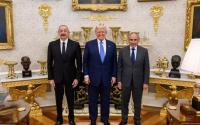17 December 2006
The 25 foreign ministers of the European Union embarrassed themselves last week when they agreed to punish Turkey for refusing to open its ports and airfields to the Greek Republic of Cyprus. The EU decision to slow down accession talks with Turkey in eight of the 35 "chapters" being negotiated makes sense only as a face-saving way to split the difference between EU members that wanted a harsher punishment and those that want to avoid antagonizing Turkey.
On its merits, the EU's sanctioning of Turkey lacks fairness. Although Turkey agreed to open its air and sea ports in a customs pact it signed last year, there is validity to its argument that the Turkish sector of Cyprus -- which only Turkey recognizes as a separate state -- suffers from a harsh embargo that the EU ought to lift if it wants those ports opened.
Turkey acted as a responsible EU candidate when it encouraged Turkish Cypriots to vote for what was known as the Annan confederation plan for Cyprus in April, 2004. Turkish Cypriots did vote overwhelmingly for the plan, but Greek Cypriots voted overwhelmingly against it, knowing that their part of the island would nevertheless gain membership in the EU. With this background in mind, Turkish leaders are entitled to view the EU's partial freeze on accession talks as one-sided, or even unjust.
It is an open secret that political pressures are a determining factor in the efforts of some countries to delay Turkey's entry into the EU or to offer Turkey something short of full membership. And even in countries that have appeared most reluctant to accommodate Turkey's bid for membership, there are differences between the views of officials and those of the electorate.
For good reason, European leaders and diplomats generally recognize that bringing Turkey into the EU will be beneficial for Europe and for Turkey. But some EU leaders feel compelled to take a tough stand on Turkey out of fear that nationalist and chauvinist parties may otherwise seize on the issue to exploit popular anxieties about high unemployment, shrinking welfare benefits, and social tensions that they believe emanate from unassimilated Muslim communities.
Instead of being driven by domestic politics or getting hung up on the knotty Cyprus issue, the EU's accession talks with Turkey ought to focus on holding Turkey to European standards on democracy and human rights. The EU will be serving the best interests of Turks and Europeans alike if it insists that the Turkish government cease using a politicized legal system to prosecute writers and publishers for their exercise of free speech. Above all, the EU should be asking hard questions about who really rules Turkey, elected politicians or the powerful military and security elites that still exercise unaccountable power over domestic and foreign policy.






